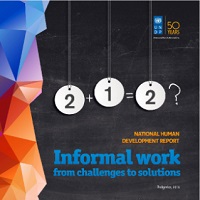UNDP - HUMAN DEVELOPMENT REPORT 2016 – MONTENEGRO. Informal Work: From Challenges to Solutions
UNDP - HUMAN DEVELOPMENT REPORT 2016 – MONTENEGRO. Informal Work: From Challenges to Solutions
Author(s): Milorad Katnić
Contributor(s): Peter Stonelake (Editor)
Subject(s): Economy, Human Resources in Economy, Socio-Economic Research
Published by: UNDP United Nations Development Programme
Summary/Abstract: This year’s National Human Development Report tackles the topic of informal work—a pressing topic that affects not only the economy but all segments of society. A third of all people in Montenegro are fully or partly informally hired, which puts them at risk of poor social and health protection. The report offers focused perspectives and an analysis of the national circumstances and strategies for reducing the scale of the informal economy and for advancing human development. The aim of the report is to bring together the facts on human development, influence national policy and mobilize various sectors of the economy and segments of society. It introduces the concept of human development into the national policy dialogue on informal employment—not only through relevant indicators and policy recommendations, but also through the country-led and country-owned processes of consultation, research and report writing.
The NHDR on the informal economy results in a set of policy options on how to reduce the volume of the informal economy in Montenegro with a specific focus on informal employment. In other words, the report’s aim is to support the transition to the formal economy. A set of adequate policies and ways to overcome the barriers to formalization were identified, while at the same time taking into account the most common limitations for the transition to the formal economy.
The NHDR has opened the debate on informal employment and its repercussions on inequalities and poverty. To make employment work to reduce poverty, the challenge is not only to create jobs, but also to create decent jobs: ones that o er adequate pay and a su cient level of social protection. Jobs in the informal sector frequently fail to o er just that. In the context of the unfolding economic crisis it is important that the commitment to poverty reduction is maintained. The recommendations defined in this document that are aimed ultimately at the formalization of labour and at overcoming exclusion and marginalization, are based on a systemic approach and aligned to the Sustainable Development Goals of the 2030 Agenda.
Series: UNDP - HUMAN DEVELOPMENT REPORTS
- Print-ISBN-13: 978-9940-614-15-7
- Page Count: 143
- Publication Year: 2016
- Language: English
- eBook-PDF
- Table of Content
- Introduction

